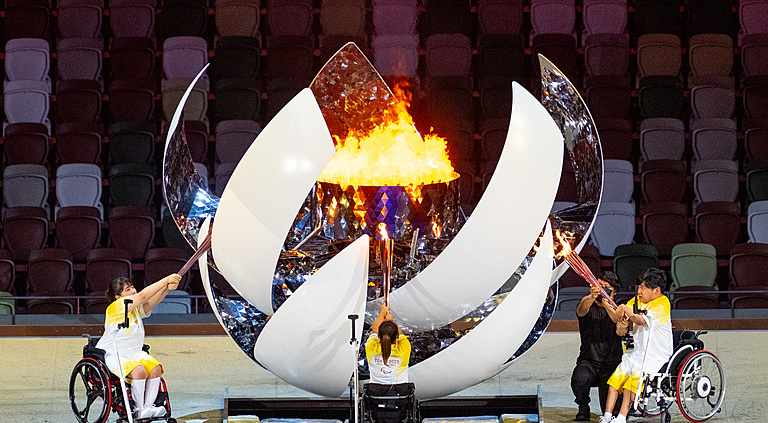Paralympic Flame to originate in Stoke Mandeville for all forthcoming Paralympic Games
As part of a thrilling global celebration of the Paralympic Day, the International Paralympic Committee made an exciting announcement. Stoke Mandeville, the historic birthplace of Paralympic sport, will play a vital role in all future Paralympic Torch Relays, commencing with the Paris 2024 Paralympic Games
This innovative concept, developed in collaboration between the International Paralympic Committee (IPC), ParalympicsGB, and WheelPower, aims to elevate global awareness of the historical significance of Stoke Mandeville and the invaluable contributions made by Sir Ludwig Guttmann to the genesis and progression of the Paralympic Movement.
Stoke Mandeville, recently celebrating the 75th anniversary of the 1948 Stoke Mandeville Games, played a significant role in commencing the London 2012 Paralympic Torch Relay. Since the Sochi 2014 Paralympic Winter Games, this historic birthplace of the Paralympic Movement has been the venue for Heritage Flame Lighting events at each Paralympic Games edition. The Heritage Flame kindled here has contributed to the creation of the Paralympic Flame in the host country.
In a tradition reminiscent of the Olympic Flame’s origin in Olympia, Greece, the plan now entails Stoke Mandeville as the birthplace of the Paralympic Flame, signifying the commencement of the Paralympic Torch Relay.
Stoke Mandeville initiates an exciting weekend of countdown celebrations for the Paris 2024 Paralympic Games. On October 8th, Paris hosted Paralympic Day at the Place de la République, featuring performances in 14 Para sports and the presence of numerous esteemed Paralympians. The Paralympic Day served as a prelude to the launch of Paralympic Games ticket sales, starting on October 9th, with 2.8 million tickets available without a ballot on the tickets.paris2024.org platform.
Andrew Parsons, IPC President, emphasized the significance of this moment, stating,
“It is fitting that 75 years on from those historic first Stoke Mandeville Games and on the eve of ticket sales for the Paris 2024 Paralympic Games, we are announcing that Stoke Mandeville will play an even greater role in all future editions of the Paralympic Games.”
He continued, “The Paralympic Movement owes Stoke Mandeville and Sir Ludwig Guttmann a tremendous debt of gratitude. What began as a small-scale sport event in 1948 at the back of a rehabilitation hospital for 16 injured war veterans has now evolved into the world’s third-largest sporting event. At the Paris 2024 Paralympic Games, 4,350 exceptional athletes from 180 countries will compete in 22 sports, with a cumulative global audience of 4.1 billion watching on TV.”
“Sir Ludwig Guttmann’s pioneering techniques revolutionized the world of sports, a value that remains at the core of the IPC today. With this innovative approach to flame lighting, we aim to pay tribute to the rich history of the Paralympic Movement while underscoring the remarkable evolution of the Paralympic Games since its inception in Rome, Italy, in 1960.
“Today, the Paralympic Games have grown into a spectacular sporting event, serving as the premier global platform that places individuals with disabilities at the forefront. The transformative legacies left by these Games, both in the host country and on a global scale, are genuinely impressive and play a pivotal role in advancing a more inclusive world for all.”
Athletes with Intellectual Impairment at Paralympic Games
Following the standard Paralympic Games in Madrid, Spain, the inaugural Paralympic Games for individuals with mental disabilities were conducted from September 15th to September 22nd. Athletes from over 70 countries competed at the games. Later, a demonstration programme for athletes with an intellectual impairment was included at the Atlanta 1996 Paralympic Games.
Today, more than 150 athletes with an intellectual impairment compete in the Paralympic Games. In Tokyo 2020, new World and Paralympic records were established in eight of the eleven para-swimming events within the S14 class and in four out of the eight para-athletics events in the T20/F20 class.
About Stoke Mandeville and the Paralympic Movement
In 1944, responding to a request from the British Government, Dr. Ludwig Guttmann established a spinal injuries center at Stoke Mandeville Hospital in Great Britain. Over time, what began as rehabilitation sport transformed into recreational and then competitive sport.
On July 29, 1948, coinciding with the Opening Ceremony of the London 1948 Olympic Games, Dr. Guttmann organized the inaugural competition for wheelchair athletes, known as the Stoke Mandeville Games. This historic event involved 16 injured servicemen and women participating in archery.
The Stoke Mandeville Games later evolved into the Paralympic Games, which made its debut in Rome, Italy, in 1960, featuring 319 athletes from 21 countries. Subsequently, these Games have been held every four years.
Guttmann’s legacy lives on through the Paralympic Movement, demonstrating his belief that individuals with disabilities can attain elite levels in sports while leveraging sports and physical activity to enhance their health and well-being.



 Virtus Sport
Virtus Sport